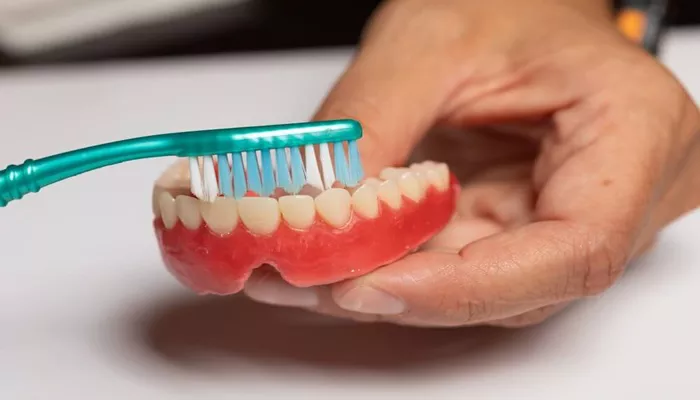White vinegar is widely recognized as an effective home remedy for removing plaque from dentures due to its high acidity, which helps break down the biofilm and tartar buildup on denture surfaces. This article explores the efficacy of white vinegar in denture cleaning, its proper usage, precautions, and complementary methods to maintain optimal denture hygiene.
Introduction
Plaque accumulation on dentures is a common issue faced by denture wearers. Plaque is a sticky, soft film of bacteria that adheres to denture surfaces, feeding on food debris and sugars. If not removed promptly, plaque can harden into tartar, leading to discoloration, bad breath, gum irritation, and potential oral infections. Maintaining clean dentures is essential not only for aesthetic reasons but also for overall oral health. Among various cleaning agents, white vinegar has gained popularity as an accessible, natural, and effective solution to remove plaque and tartar from dentures.
What Is Plaque and Why Is It Important to Remove It from Dentures?
Plaque is a biofilm composed of bacteria and food particles that forms on both natural teeth and dentures. On dentures, plaque can cause:
- Discoloration and unsightly buildup
- Bad breath due to bacterial activity
- Gum inflammation and irritation
- Increased risk of oral infections
If plaque is not regularly removed, it mineralizes into tartar, which is much harder to eliminate and requires professional cleaning.
Therefore, effective plaque removal is crucial for denture maintenance and oral health.
How Does White Vinegar Work to Remove Plaque from Dentures?
White vinegar contains acetic acid, which has a potent ability to dissolve mineral deposits and biofilm on denture surfaces.
The acidic environment created by vinegar breaks down the plaque matrix, loosening the buildup and making it easier to remove through brushing or rinsing.
Vinegar’s acidity disrupts bacterial colonies and softens hardened plaque and tartar.
It also has mild antibacterial properties that help reduce bacterial load on dentures.
Unlike some harsh chemicals, vinegar is a natural and inexpensive option readily available in most households.
How to Use White Vinegar to Clean Dentures Effectively
Step-by-Step Guide
Inspect Your Dentures: Ensure your dentures do not contain metal components, as vinegar can corrode metal parts.
Prepare the Vinegar Solution: Use undiluted white vinegar or mix equal parts white vinegar and lukewarm water.
Soak the Dentures: Place your dentures in a cup and cover them completely with the vinegar solution.
Soaking Duration: Allow the dentures to soak overnight or for at least 15-30 minutes for lighter plaque buildup.
Brush the Dentures: After soaking, use a soft-bristled toothbrush to gently scrub the dentures, focusing on areas with visible plaque or tartar.
Rinse Thoroughly: Rinse the dentures under running water to remove any residual vinegar and loosened deposits.
Dry and Store Properly: Allow dentures to air dry or store them in a clean container as per your dentist’s advice.
Frequency of Use
Soaking dentures in vinegar once a week is generally safe for most denture materials.
Frequent or prolonged exposure to vinegar should be avoided to prevent potential damage to the denture acrylic or metal parts.
Advantages of Using White Vinegar for Denture Cleaning
Cost-Effective: White vinegar is inexpensive and widely accessible.
Natural and Non-Toxic: It avoids harsh chemicals often found in commercial cleaners.
Effective Against Plaque and Tartar: The acid content dissolves plaque biofilm and tartar buildup.
Antibacterial Properties: Helps reduce bacterial colonization on dentures.
Easy to Use: Simple soaking and brushing routine.
Limitations And Precautions
Not Suitable for Metal-Containing Dentures: Vinegar can corrode metal clasps or frameworks.
Potential Material Damage: Excessive use may degrade acrylic over time.
Not a Substitute for Professional Cleaning: Regular dental visits remain essential for thorough denture maintenance.
May Not Remove Heavy Stains: For severe discolorations or tartar, specialized denture cleaners or professional ultrasonic cleaning may be necessary.
Complementary Methods to Enhance Denture Cleaning
While white vinegar is effective, combining it with other cleaning methods can improve denture hygiene:
Baking Soda Paste: Acts as a mild abrasive to scrub away plaque without damaging denture surfaces.
Hydrogen Peroxide Soak: Helps whiten dentures and remove stains, but should be used cautiously due to its abrasiveness.
Commercial Denture Cleaners: Formulated to safely remove plaque, tartar, and stains.
Regular Brushing: Using a soft-bristled toothbrush daily to prevent plaque buildup.
Professional Cleaning: Dentists can perform ultrasonic cleaning to remove stubborn deposits.
Conclusion
White vinegar is a valuable, natural agent for removing plaque from dentures, especially for those without metal components. Its high acidity effectively breaks down plaque and tartar, facilitating easier cleaning and maintaining denture hygiene. However, it should be used judiciously and in combination with regular brushing and professional dental care to ensure the longevity of dentures and optimal oral health. Denture wearers should consult their dental professionals before adopting vinegar or any home remedy as part of their cleaning routine to tailor care to their specific denture type and oral condition.

